
The REMADE (Reducing Embodied-Energy and Decreasing Emissions) Institute announced July 11 its first round of projects to receive funding. The REMADE Institute launched in early 2017 and has been working through the selection process since last summer.
REMADE is funded partially through the U.S. Department of Energy, and its goal has been to develop technologies reducing energy usage and greenhouse gas emissions in manufacturing by improving recycling, remanufacturing and reuse.
A handful of projects selected during the first funding round are related to electronics recycling. E-Scrap News queried REMADE for more information and compiled the following roundup of four e-scrap-related projects.
Looking at e-scrap on a systems level: This project will be completed by Idaho National Lab and electronics recycling company SunnKing. The project, called “Evaluation of logistics Systems for Collection, Reprocessing, and Production of Secondary Feedstocks from e-Waste,” will examine inefficiencies within the logistics of the current electronics recycling system. “Two reasons for difficulty in accessing residential e-wastes are ineffective placement of collection facilities and low-economic incentives,” REMADE wrote in a project overview. “This results in low availability of raw feedstocks, therefore causing higher costs due to competition between recyclers.” The project proposes to help provide a systems-level understanding of the sector, aiming to help individual players see how their operations are connected to the wider “ecosystem” of e-scrap recovery.
New approach to foster circuit board reuse: Completed by Caterpillar, CoreCentric and the Rochester Institute of Technology, this project will focus on removing the coating material that’s applied to circuit boards during their production. The coating is usually made from silicon or epoxy and is applied to protect the circuit board, but it creates a barrier to reusing circuit boards at end-of-life. The boards are often damaged during removal of the coating. According to REMADE, this project, titled “Epoxy/Silicon Potting Material Removal for Greater Recovery of Circuit Boards,” will rectify “a lack of knowledge of how to effectively and cost-efficiently remove silicon and epoxy potting material without damaging the circuit board,” REMADE wrote.
Deeper dive into device condition: This project, which is being undertaken by the same organizations as the circuit board reuse venture, aims to expand device testing to measure finer details that don’t show up during functional testing. Although functional testing is the industry norm, “there are no technologies available to measure or detect latent defects in used printed circuit boards,” according to REMADE. As an example, the project points to solder joint degradation in circuit boards. This wear-and-tear is responsible for roughly 13 percent of device failures, according to the project overview, but functional testing does not reveal the solder joint condition. Manual inspection of these components is often cost- and time-prohibitive, so the goal of this project, titled “Condition Assessment of Used Electronics,” is to explore technologies that could perform that task in an efficient manner.
Shifting design for an emerging stream: Solar panels are growing as a portion of the end-of-life stream. According to the REMADE description, the “Development of an Industrially Relevant RE-SOLAR Design Framework” project will examine how to improve design-for-recycling. The project will look at the life cycle impact of different materials and manufacturing choices, as well as the economics of various types of end-of-life recovery. “This is an imminent and critical challenge as previously installed solar modules are now creating a surge of electronic waste,” REMADE wrote. “The installation of new systems is also rapidly being scaled up and may create tremendous amounts of e-waste at the end of their lifespan.”
Photo credit: Dutourdumonde Photography/Shutterstock
More stories about research
- Project brings rare earth recovery into e-scrap facility
- Texas A&M researches rare earth extraction
- Report: Battery ‘retirement tide’ nears